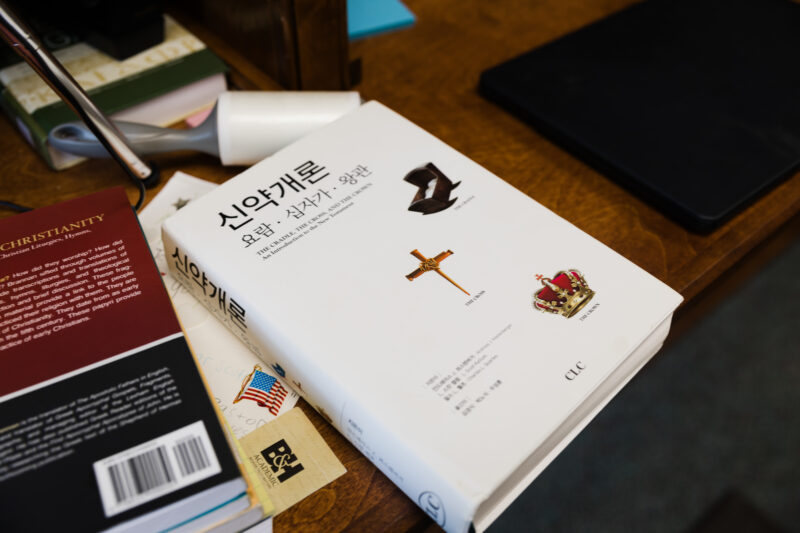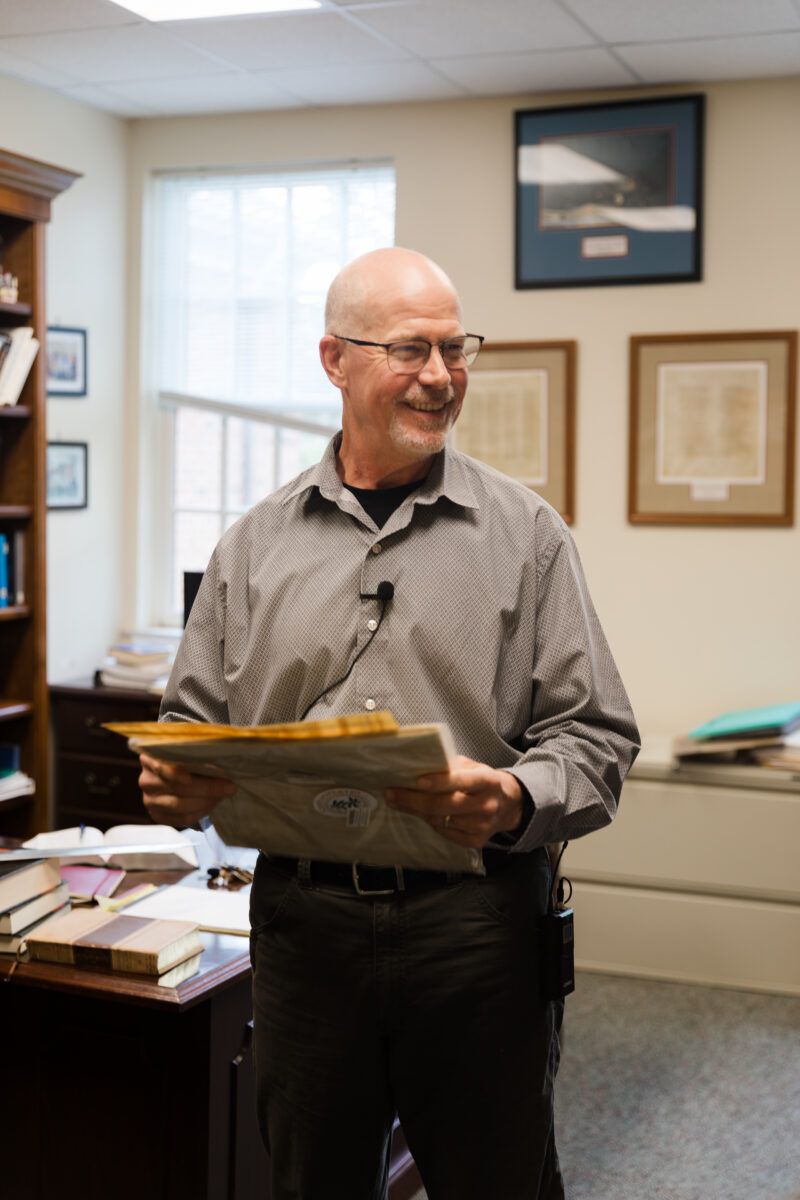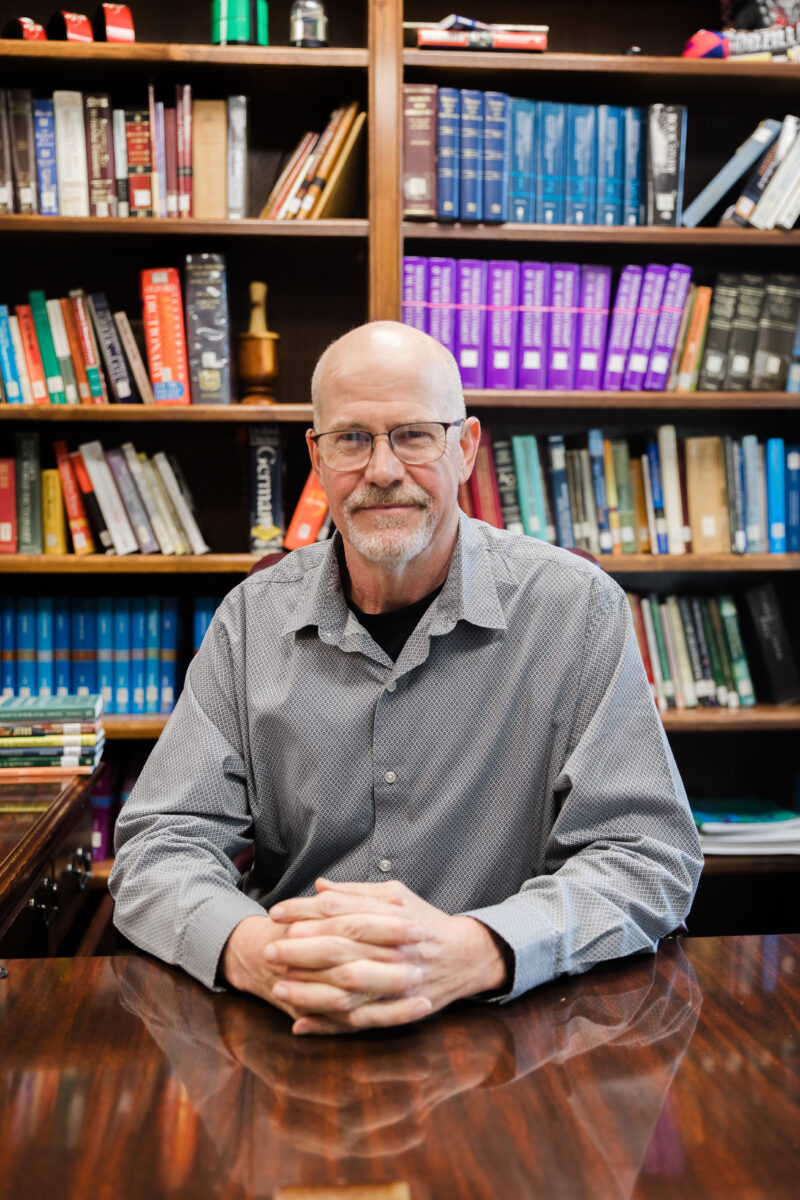At The Office With Dr. Kellum
Mary Asta Mountain | August 19, 2024

Having taught at Southeastern for over 20 years, Scott Kellum exudes a passion for God’s word and for his people. As a biblical languages and New Testament expert, Kellum enjoys the world of academia, but even more so, he loves his family, his students, and the simple things of life.
In the following Q&A, Kellum, senior professor of New Testament and Greek, takes the time to share about his history, hobbies, and life pursuits.
How did you meet your wife, Cathy?
I met Cathy at church in a program called Training Union. I was a college student at Ole Miss at the time, and she had just graduated high school. It took a little time for us to start dating, but when I got the chance to pursue something with her, I stepped right up. She is the very center of our family. In our circle of friends and family, Cathy is known as Momma, and she epitomizes that role. I call her “my precious bride.” I am very blessed.
What do you and your family like to do when you have some free time?
To be honest, we have very little of that in our lives, but we use it well. We like to go on outings, and we travel a good bit because one of my daughters is a flight attendant. We like camping; we’ll do movies sometimes and just general American stuff. We’re such country folk. I’m excited because I brought back a fishing kayak from my last trip to Mississippi, and I’m looking forward to getting some river time. I love deer hunting, outdoor stuff, and just doing things with my hands. It’s not your typical academic sort of past time.
How did you and Chuck Quarles become friends?
I do not remember a time when I did not know Chuck. We went to the same elementary school, middle school, and high school. He grew up in Tula, and I was more in the south of the county, but we went to a unified county school. We had the same scholarship to Ole Miss too. Then we were at Mid-America at the same time and were roommates.
At that time I wanted to be a missionary; I wanted to be on the front lines as I perceived it. During senior preaching week, Chuck preached a sermon on Ezekiel 33, about the watchmen on the wall and the message that, “If you don’t go, their blood is on your hands.” And I cannot explain it, but God said to me — louder than an audible voice — “You’re not going. You’re going to teach.” That significant moment in my life set in motion a series of things.
I cannot explain it, but God said to me — louder than an audible voice — “You’re not going. You’re going to teach.”
What led you to pursue your studies in New Testament and Greek?
So, I got a degree in classical Greek by accident. Greek sounded to me like pain and suffering, but I needed a foreign language in college, and I could get out of a year of non-credit classes in seminary if I took it early. Then my college asked me to make it my major to save their degree program, so I double majored in art and classical civilization with an emphasis in Greek.
I lost half of my hours when transferring between different seminaries, but I had advanced standing, so I didn’t have to retake the courses — I could take other courses instead, particularly biblical studies. So I took nothing but language courses, and that resulted in me having 21 hours of Hebrew and 52 hours of Greek on a college or seminary level. I don’t expect everybody to do that sort of thing. But it’s that kind of outcome that makes you say, “Okay, God did this.” My interest in New Testament went alongside Greek; I never actually considered another area.
What mindset should students have when attempting to translate or understand a difficult biblical text?
Let’s start with the perspicuity of Scripture. That means the clarity of Scripture, namely, that when the Bible was written, the writer expected the original reader to understand it. So, we get a basic translation, and then we realize we’re going to have to work a little bit harder. We look and see, does the author address the topic elsewhere in the book and elsewhere in Scripture? If he does, then we have somewhat of a guideline to help us, and then we closely analyze the text in its context to discover the meaning.
What research or writing projects are you currently working on?
I am currently working on the Evangelical Exegetical Commentary of Acts. It will be around 300,000 words long, not including footnotes, and I’m looking forward to it. We’re in the beginning stages of getting that ball rolling. I also have an essay that’s coming out on the early closing of the canon. It will be paired with the work of somebody who has a different opinion.
How have your experiences teaching on short-term mission trips shaped the way you view your role as a professor?
It’s really helped me in terms of my relationship to my culture. As I see my brothers and sisters in Christ relate to their government that looks skeptically on them, it helps me to view my culture through the prism of the kingdom. I think the church is more authentic on the outside of culture addressing it than trying to be the center of culture. I’m proud to be an American and grateful for the country that we have. But my identity is not American; my identity is Christian, and so I identify more with those fellow believers in other countries.
As I see my brothers and sisters in Christ relate to their government that looks skeptically on them, it helps me to view my culture through the prism of the kingdom.
What about your experiences as a pastor? How have these influenced the way you view teaching and missions?
I think my experience as a pastor prepared me for the teaching ministry. I think it’s very valuable to have experience in the church as I teach those going to the churches. I find a deep satisfaction in ministering to the people of God and especially teaching lay people because I am so often teaching those in the realm of academics.
What has God been teaching you in his word lately?
I’ve just now transitioned over to Jeremiah, and it might be better to ask me this question when I’m through with the book. In the first part I have been particularly struck by the comparison between “faithless Israel” and “treacherous Judah.” It points out the treasonous nature of idolatry in God’s people. It’s very convicting. I tend to be a deep-diver in Scripture, even when reading devotionally. When I see the depths in the word of God, it’s life giving.








